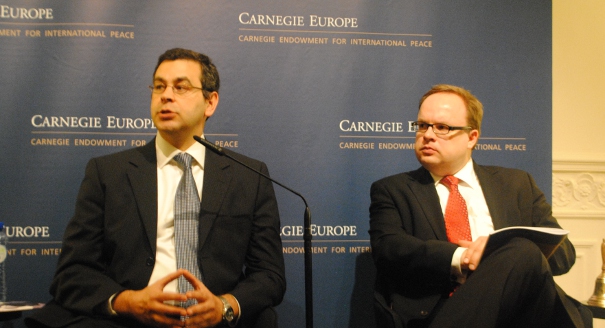Registration
You will receive an email confirming your registration.
IMGXYZ3441IMGZYXTurkey has a potentially valuable role to play in supporting democracy and state-building in the Arab world, but big questions about that role abound.
Carnegie Europe hosted a briefing on the complexities and potential of the Turkish model in the Arab world with Carnegie's Sinan Ülgen, Alexandros Yannis, strategy advisor in the European External Action Service, and His Excellency Selim Yenel, Permanent Delegate of Turkey to the European Union. The event marked the European launch of Ülgen's new paper, From Inspiration to Aspiration: Turkey in the New Middle East. Carnegie’s Jan Techau moderated.
Five Features of the Turkish Model
Ülgen outlined five features of the Turkish model that could prove valuable for transitioning countries in the Arab world:
- the successful accommodation of democratic secularism and political Islam;
- the normalization of the civil-military relationship to ensure democratic standards;
- market-state relations that produced inclusive growth and a strong business community;
- a state legacy, in form of bureaucratic traditions, carried over from the Ottoman empire that fosters trust in state institutions; and
- links to the West, particularly NATO, the European Union, and the Council of Europe that forced Turkey to associate with the West and comply with European norms.
A Model or a Source of Inspiration?
- Model: Ülgen argued that the Arab World’s cultural affinity with Turkey makes the Turkish model particularly relevant to its neighbors, as several regional opinion polls have demonstrated.
- Inspiration: Yannis asserted that, wisely, Turkey does not actively try to impose itself as a model; rather, it offers elements for inspiration, an approach that is better received by its neighbors.
- Fading Appeal?:Recent developments in Turkey, such as the limitations imposed on the Turkish press, have negatively affected the model’s regional appeal, which depends on the government’s support for democratic institutions and principles, agreed Yannis and Ülgen.
Recommendations for Cooperation
- Political Party Formation and Support: The desire of political Islamic movements in the region to learn from and associate themselves with Turkey’s ruling AKP party provides the Turkish government with a degree of leverage in influencing these actors, Ülgen added.
- Economic and Social Governance: Ülgen stressed that Turkey’s experience with overcoming its tendency towards economic populism as well as its experience with receiving aid from international financial institutions can be valuable for transitioning Arab countries, especially in the fields of banking, development of the private sector, and the creation of affordable mass housing.
Turkey and the EU
EU member states have not been responsive to Turkey’s continuous efforts to establish a comprehensive cooperative framework to address the on-going transitions in the Arab World, limiting cooperation to interaction between Turkey and EU High Representative Ashton, Yenel commented. Yannis argued that the EU should actively re-evaluate its engagement with Turkey, because Turkey is an influential regional player and because wider cooperation with Turkey would provide the EU with an important learning experience for Europe’s engagement with other regional actors.
